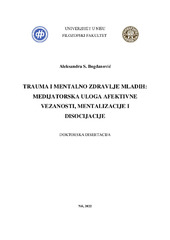Приказ основних података о дисертацији
Trauma i mentalno zdravlje mladih: medijatorska uloga afektivne vezanosti, mentalizacije i disocijacije
| dc.contributor.advisor | Stefanović-Stanojević, Tatjana | |
| dc.contributor.other | Mitrović, Milica | |
| dc.contributor.other | Gavrilov-Jerković, Vesna | |
| dc.contributor.other | Georgievska, Sofija | |
| dc.creator | Bogdanović, Aleksandra S. | |
| dc.date.accessioned | 2023-02-15T20:36:01Z | |
| dc.date.available | 2023-02-15T20:36:01Z | |
| dc.date.issued | 2022 | |
| dc.identifier.uri | http://eteze.ni.ac.rs/application/showtheses?thesesId=8565 | |
| dc.identifier.uri | https://fedorani.ni.ac.rs/fedora/get/o:1840/bdef:Content/download | |
| dc.identifier.uri | https://plus.cobiss.net/cobiss/sr/sr/bib/73433609 | |
| dc.identifier.uri | https://nardus.mpn.gov.rs/handle/123456789/21185 | |
| dc.description.abstract | The aim of this research was examining the effect of early trauma experiences on the development of maladaptive mental health outcomes, as well as to test the effects of attachment, mentalization and dissociation in this relationship. The sample was was comprised of 121 adolescents from foster care in Republic of Serbia, aged 11 to 18. The respondents filled in a battery of instruments, including Childhood Trauma Questionnaire – CTQ (Bernstain i Fink, 1998), Relationship Questionaire-Clinical version RQ-CV (Holmes & Lyons-Ruth, 2006), The Reflective Functioning Questionnaire, RFQ (Fonagy et al., 2016), Dissociative experience scale for adolescents, A-DES (Armstrong, Putnam, Carlson, Libero & Smith, 1997) and Child behavior checklist-youthself report (Achenbach & Rescorla, 2001). Our findings suggest that dissociation had statistically significant mediating role in the relationship between trauma and internalizing (b=.1.81, SE=.04, p<.001 externalizing (b=2.86, SE=.49, p<.001) and social problems (b=.43, SE=.04, p<.001). Attachment and mentalization can be considered as a moderators of the examined relationships, since results of models testing moderation effects showed that trauma and attachment security (b=-.05, SE=.01, p<.001) and trauma and profound-distrust (b=.99, SE=.01, p<.001) had a significant interaction effect on internalizing symptoms; that trauma and hypomentalization (b=.01, SE=.00,p<.001) had a significant interaction effect on externalizing symptoms; while trauma and hypermetalization had a significant interaction effect on externalizing symptoms (b=-.01, SE=.00, p<.05) and social problems (b=-.005, SE=.001, p<.001). The obtained results were interpreted within the context of contemporary theoretical conceptualizations focusing on resilience (secure attachment style, optimal reflective functioning, hypermentalizing) and vulnerability (profounddistrust, hypomentalizing) factors in response to trauma. Practical implications and limitations of this study were discussed | en |
| dc.format | application/pdf | |
| dc.language | sr | |
| dc.publisher | Универзитет у Нишу, Филозофски факултет | sr |
| dc.rights | openAccess | en |
| dc.rights.uri | https://creativecommons.org/licenses/by-nc/4.0/ | |
| dc.source | Универзитет у Нишу | sr |
| dc.subject | rana traumatska iskustva | sr |
| dc.subject | trauma | en |
| dc.subject | foster care | en |
| dc.subject | attachment | en |
| dc.subject | mentalization | en |
| dc.subject | dissociation | en |
| dc.subject | internalization | en |
| dc.subject | externalization | en |
| dc.subject | social problems | en |
| dc.subject | hraniteljstvo | sr |
| dc.subject | afektivna vezanost | sr |
| dc.subject | mentalizacija | sr |
| dc.subject | disocijacija | sr |
| dc.subject | eksternalizacija | sr |
| dc.subject | internalizacija | sr |
| dc.subject | problemi u relacijama | sr |
| dc.title | Trauma i mentalno zdravlje mladih: medijatorska uloga afektivne vezanosti, mentalizacije i disocijacije | sr |
| dc.type | doctoralThesis | |
| dc.rights.license | BY-NC | |
| dc.identifier.fulltext | http://nardus.mpn.gov.rs/bitstream/id/149446/Doctoral_thesis_13232.pdf | |
| dc.identifier.fulltext | http://nardus.mpn.gov.rs/bitstream/id/149447/Bogdanovic_Aleksandra_S.pdf | |
| dc.identifier.rcub | https://hdl.handle.net/21.15107/rcub_nardus_21185 |



